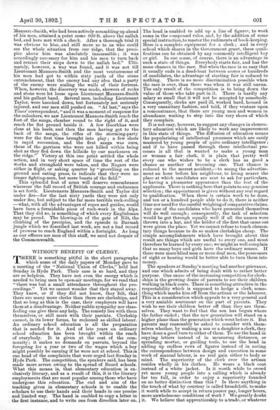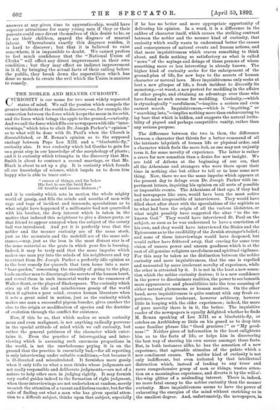WITHOUT BENEFIT OF CLERGY. T HERE is something pitiful in the
short paragraphs which some of the daily papers of Monday gave to a meeting of the "National Union of Clerks," held last Sunday in Hyde Park. Their case is so hard, and they are so helpless. They have not even the energy which is needed to bring men to open-air meetings, for we read that " there was but a small attendance throughout the pro- ceedings." Yet we cannot wonder that they stayed away. They knew, or if they did not know, they felt, that there are many more clerks than there are clerkships, and that so long as this is the case, their employers will have them at a disadvantage. Neither public sympathy nor class- feeling can give them any help. The remedy lies with them themselves, or still more with their parents. Clerkship cannot, in its lower forms, be reckoned as skilled labour. An ordinary school education is all the preparation that is needed for it. And of late years an ordinary school education has been brought within the reach of everybody. It is given at the cost of the com- munity; it makes no demands on parents, beyond the foregoing for a year or two of the wages which a boy might possibly be earning if he were not at school. This is one head of the complaints that were urged last Sunday in Hyde Park. The competition, the speakers said, has been made more severe owing to the spread of Board schools. What this means is, that elementary education is ex- clusively literary, and as a result of this, it is the literary employments that are most popular among those who have undergone this education. The end and aim of the teaching given in elementary schools is to enable the scholars to use their hands and their heads in one precise and limited way. The hand is enabled to copy a letter in the first instance, and to write one from direction later on. The head is enabled to add up a lino of figures, to work sums in the compound rules, and, by the addition of some special instruction, to master the rudiments of book-keeping. Here is a complete equipment for a clerk ; and in every school which shares in the Government grant, these quali- fications can be obtained by any commonly intelligent boy or girl. In one sense, of course, there is an advantage in such a state of things. Everybody starts fair, and has the same chances in the race. But when the race is so easy that it usually ends in a dead-heat between scores or hundreds of candidates, the advantage of starting fair is reduced to nothing. There is no more discrimination possible when the race is over, than there was when it was still unrun. The only result of the competition is to bring down the value of those who take part in it. There is hardly any salary so small that it will not be accepted by somebody. Consequently, clerks are paid ill, worked hard, housed in a very unsanitary fashion, and told, if they venture upon a remonstrance, that there are young men and women in abundance waiting to step into the very shoes of which they complain. It is not easy, however, to suggest any changes in elemen- tary education which are likely to work any improvement in this state of things. The diffusion of education means the popularising of intellectual processes which are easily mastered by young people of quite ordinary intelligence ; and if to have passed through these intellectual pro- cesses is all that is wanted to make a young man or woman a fair clerk, it is plain that pretty well every one who wishes to be a clerk has as good a chance as another of becoming one. That chance is reduced to the merest accident,—to seeing the advertise- ment an hour before his neighbour, to living nearer the place at which candidates are sent to ask for particulars, to having a pleasanter appearance than the rest of the applicants. There is nothing here that points to any genuine selection; the appointment is given without any real regard to qualification. When there is certain work to be done, and ten or a hundred people able to do it, there is neither time nor need for the careful weighing of comparative claims. Any one of the candidates who have presented themselves will do well enough ; consequently, the task of selection would be got through equally well if all the names were thrown into a hat, and the holder of the first that came out were given the place. Yet we cannot refuse to teach elemen- tary things because to do so makes clerkships cheap. The simple accomplishments which have brought about this result are things which are useful to every one, and must therefore be learned by every one; we might as well complain that so many boys and girls have the ordinary senses. If there were more blind men or more deaf men, the possessors of sight or hearing would be better able to turn them into money.
The speakers at Sunday's meeting had another grievance, and one which admits of being dealt with to rather better purpose. One cause of the increasing competition for clerk- ships is the growing desire of parents to see their children working in black coats. There is something attractive in the respectability which is supposed to hedge a clerk, some- thing which marks him off from the artisan or the labourer.
This is a consideration which appeals to a very general and a very amiable sentiment on the part of parents. They wish to see their children better off than they are them- selves. They want to feel that the son has begun where the father ended ; that the new generation will stand on a higher plane than the generation which went before it. But parents may reasonably be asked to consider with them- selves whether, by making a son or a daughter a clerk, they have done a good turn to either of them. To use the hand in copying letters instead of in measuring distances, or spreading mortar, or guiding tools, to use the head in adding up endless rows of figures instead of in noting the correspondence between design and execution in some work of manual labour, is no real gain either to body or mind. The superiority of the clerk over the artisan resides wholly in his clothes. He wears a black coat instead of a white jacket. Is it worth while to crowd yet more young people into a calling which is already far too full, in order to enjoy a superiority founded on no better distinction than this ? Is there anything in the touch of what by courtesy is called broadcloth, to make it worth while to accept in return poorer pay, longer hours, more unwholesome conditions of work ? We greatly doubt it. We believe that apprenticeship to a trade, or whatever answers at any given time to apprenticeship, would have superior attractions for many young men if they or their parents could once divest themselves of this desire to be, or to see their children, spared the disgrace of manual labour. Whereabouts exactly this disgrace resides, it is hard to discover; but that it is believed to exist somewhere, it is impossible to doubt. We cannot profess to feel much confidence that the " National Union of Clerks " will effect any direct improvement in their own condition ; but they may effect an indirect improvement in it if, by bringing the actual facts of their calling before the public, they break down the superstition which has done so much to create the evil which the Union is anxious to remedy.



















































 Previous page
Previous page